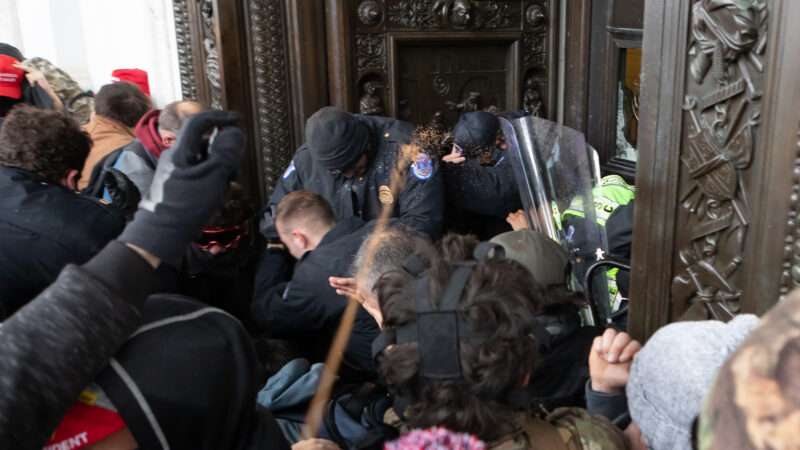
You may have heard that the Republican National Committee (RNC) described last year's Capitol riot as "legitimate political discourse." Although that is what The New York Times and other news outlets reported last week, it is not actually true.
It is true, however, that the RNC, which used that phrase when it censured Reps. Liz Cheney (R‒Wyo.) and Adam Kinzinger (R‒Ill.) for participating in the House committee investigating the events of January 6, 2021, did not explain what it meant until after its misbegotten resolution generated a predictable storm of criticism. The episode illustrates why neither Republicans nor Democrats can be trusted to give an honest account of what happened that day or what it signified.
RNC Chairwoman Ronna McDaniel called the Times story "completely false." She said the RNC censured Cheney and Kinzinger because they joined "a Democrat-led persecution of ordinary citizens who engaged in legitimate political discourse that had nothing to do with violence at the Capitol."
The heart of McDaniel's complaint is that the January 6 committee has gone beyond investigating the riot itself to explore the circumstances in which it happened. The committee is looking into the planning of the "Save America" rally that preceded the violent assault on the Capitol, for example, and it has issued subpoenas to Republicans who presented themselves as "alternate electors," which was part of the quixotic effort to keep Donald Trump in office.
McDaniel is right that much of what the committee is investigating involved the exercise of constitutional rights, including freedom of speech, freedom of assembly, and the right to petition the government. And it is important to distinguish between peaceful protest and political violence: While tens of thousands of Trump supporters attended the "Save America" rally, the FBI so far has charged fewer than 800 in connection with the riot.
The Justice Department estimates that as many as 2,500 people could ultimately be arrested for crimes committed at the Capitol, including trespassing, disorderly conduct, vandalism, and assault. That is still a small fraction of the Trump supporters who were in Washington, D.C., that day to hear the president and his allies decry the imaginary conspiracy that supposedly denied him a second term.
Still, it is impossible to understand the riot without understanding its context: Trump's unprecedented, monthslong refusal to accept the results of the presidential election. When Trump urged his followers to march on the Capitol and "peacefully and patriotically make your voices heard," it was foreseeable that some of them would go further than that.
The argument that Trump's inflammatory "fight like hell" rhetoric was protected by the First Amendment did not save him from a second impeachment. Nor should it have, since the issue was not criminal liability but the dereliction of duty he displayed before and after the riot started.
It is understandable that a party still dominated by Trump and his supporters does not want people to dwell on these facts. It is likewise understandable that the opposing party wants to constantly remind voters of them.
As outrageous as the riot was, however, it is simply not true that it "almost succeeded in preventing the democratic transfer of power," as former President Jimmy Carter recently claimed. Vice President Mike Pence had already announced that he would not participate in Trump's bizarre scheme to overturn the election results, which Congress certified that night.
Even the most aggressive rioters literally did not know which way to turn after they broke into the Capitol, let alone what their practical goal was. This was more like a temper tantrum than an incipient coup.
Warnings that the riot could prove to be the opening battle of a civil war are likewise overblown. That fear is based mainly on polling results that, like news reports on the RNC resolution, grossly exaggerate the extent to which Americans condone political violence.
Both parties are bending reality to fit their political goals. That temptation makes understanding the riot and its implications harder than it should be.
© Copyright 2022 by Creators Syndicate Inc.
The post Partisan Politics Cloud the Capitol Riot's Significance appeared first on Reason.com.







